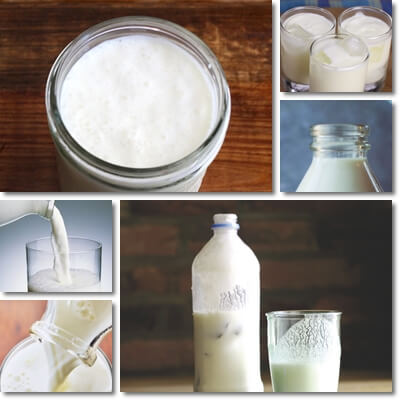What is soured milk? Soured milk is a thicker, almost yogurt-like type of milk with a sour, acidic taste. Traditional soured milk is obtained naturally through fermentation from sweet or raw, whole cow’s milk (or other types of regionally available milk). Commercial soured milk is obtained from milk to which an acidifying agent and sometimes also specific bacterial cultures are added. Soured milk is a healthy probiotic food that supports digestive health by contributing to good gut bacteria populations. In addition to digestive benefits, it is a good source of vitamin B12 in particular, but dietary minerals, protein and fat. Soured milk is good for brain and nervous system health, regulates metabolism, boosts immunity and supports muscle growth.
How is soured milk made?
Traditionally, soured milk was made through natural bacterial fermentation. Fresh (sweet, uncooked), whole milk would be left at room temperature anywhere from several hours to 1-2 days. During this time, bacteria eat the sugar lactose in the milk and produce natural acids like lactic acid; the final result is a naturally soured milk product. The commercial variant of soured milk is currently made through acidification and sometimes also addition of bacterial cultures. Acidic elements like acetic acid from vinegar or citric acid from citrus fruits or more commonly lemon juice are added to milk to turn it sour. As such, based on the production method, there are two main types of soured milk: traditional and commercial (also called acidified milk).

1) Traditional soured milk is made by leaving fresh, raw (sweet), whole milk out at room temperature for 24-48 hours. The lack of refrigeration allows bacteria naturally present in the milk to ferment it and turn it sour. As a result of the natural fermentation process, the milk also coagulates and becomes thicker, similar to yogurt. In the case of traditional soured milk, bacterial fermentation does not yield a uniform product, which is why soft, semi-solid portions of milk alternating with thinned milk may be observed. Mixing the final product ensures a more uniform consistency. Depending on the type of milk used, difference in fermentation time, bacteria cultures present as well as variations in taste and even consistency, traditional soured milk can be considered an artisanal food product.
2) Commercial soured milk is soured milk that you find in supermarket shelves, produced through acidification and sometimes also addition of bacterial cultures. It differs from traditional soured milk in that an acidic liquid is added to milk to give it a sour taste and help along the curdling process. It is often made to be a more uniform product with a relatively uniform taste and consistency. One way to do this is to previously homogenize milk (but not pasteurize). What this means is that high pressure is used to dissolve the fat particles in the milk and make them smaller in order for them to better mix with the protein and the liquid part, resulting in a milk with a more uniform consistency. Alternatively, the product can be made more uniform in consistency following acidification.
Acetic acid from vinegar, citric acid from citrus fruits, tartaric acid found in citrus fruits, grapes, even bananas, malic acid from apples (and other fruits) or vinegar made from apples, phosphoric acid used in cola soft drinks, adipic acid also found in small amounts in beets and lactic acid obtained mostly from bacterial fermentation are some of the preferred acidifying or souring agents used for making commercial soured milk.
Some are obtained naturally from various foods (citrus fruits, apples, grapes) or bacterial fermentation (example: lactic acid), others artificially, through chemical synthesis. Bacteria cultures, usually lactic acid bacteria, may be added or not. Each producer has their own recipe for making soured milk which ensures a final product with a flavor profile that is consistent over time, unlike home-made, traditional soured milk which may taste differently each time it’s made.

Is buttermilk and soured milk the same thing?
No. They are in fact different. Buttermilk is the acidic liquid left from churning butter. Whole, fresh milk would be left to sit and ferment until the fat separated from the liquid. The fat (also known as butterfat or milk fat) would be then removed and used to make butter, while the remaining, acidic-tasting, skim liquid would be consumed as buttermilk or used in cooking. Soured milk is fermented whole milk that keeps its fat; it has a thicker, quite creamy consistency, similar to yogurt and a sour taste. In cooking, especially baking, soured milk can be used instead of buttermilk and vice-versa, with little overall difference in taste.
What does soured milk taste and smell like?
For the most part, it will taste sour, acidic, tangy, sharp, with a more or less prominent flavor, depending on how it’s made (natural bacterial fermentation or addition of acidifying agents). Soured milk will also have a mildly sour, acidic odor, but overall pleasant. Home-made or traditionally made soured milk tends to have more flavor and a slightly stronger odor. However, it will not necessarily taste exactly the same every time you make it. Prominence of certain lactic bacteria cultures in the milk, fermentation time, addition of acidifying agents and other variables can influence taste, consistency and smell. Store-bought acidified sour milk has a higher chance of maintaining a consistent taste and odor over time due to the standardized production process, but only within the line of products of the same brand.
Soured milk health benefits and nutrition facts
How exactly is soured milk good for you?
1) Probiotic food. Because it is a product of bacterial fermentation, soured milk is a probiotic food. This means that it contains live, beneficial lactic acid bacteria which actively contribute to the human gastrointestinal flora and provide benefits for digestion, vitamin production, nutrient absorption, immunity and metabolism. Such benefits are a result of a regular intake of probiotic foods.
Soured milk and cancer. Soured milk contributes to good gut bacteria populations. And a healthy gut ecosystem is known to maintain the health of the gut lining via fermentation processes. Some of the by-products of bacterial fermentation in the gut have beneficial effects on colon health and are believed to reduce risks of colon cancer.
2) Source of quality protein. Because it’s made from whole milk, soured milk contains all the protein occurring naturally in it. 100 g of milk contains an estimated 3.2 g of protein, as such, the same amount of soured milk will contain about the same amount of protein. The amino acids that make up protein help produce neurotransmitters for the brain that regulate mood and cognitive functions. Protein further helps create muscle mass and eating fermented milk products like soured milk can have a beneficial impact on muscle building.
3) Soured milk and weight loss. Soured milk maintains roughly the same energetic value, fat and protein content as the whole, raw milk it’s made from. A general estimate is 60 kcal/100 g of whole, raw cow’s milk, over 3 g of protein and over 3 g of fat. If consumed in limited amounts, as part of a balanced and varied diet, soured milk can encourage weight loss and help you maintain a steady weight. Moreover, it’s probiotic properties regulate digestion and nutrient absorption which may further hold benefits for weight loss.
Soured milk and diabetes. If it helps with weight management, soured milk may constitute a good food to eat for diabetes. However, given the complex nature of the disease, it’s important to talk to your doctor first about how to best include such foods into your diet.
4) Good vitamin and mineral profile. Because the milk is not pasteurized, just fermented, it maintains a good vitamin and mineral profile. Soured milk offers good nutrition because it contains good amounts of vitamins B12 and choline, smaller amounts of vitamins B1, B2, B6, vitamin C and fat-soluble vitamins A, D, E and K. Soured milk contains calcium, magnesium, potassium, phosphorus and sodium. Moreover, beneficial bacteria in the soured milk may help with vitamin synthesis in the gastrointestinal system. Overall, it provides good nutrition.
5) Food for the brain. The fat and amino acids in the protein contained in sour milk help maintain brain health and support cognitive functions, including learning. Eating sufficient fat and protein is also a good remedy for brain fog. Moreover, choline and vitamin B12 in milk and its by-products have been shown to hold benefits for memory, protect nerve cells from demyelination (losing their insulating coating) and support brain and nervous system development of babies in the womb.
Soured milk and lactose intolerance
Soured milk is potentially good for lactose intolerance. The natural bacterial fermentation process transforms the sugar lactose into acids and sours the milk. As such, it is possible for some people with lactose intolerance to experience little or less side effects if they drink soured milk compared to regular milk. However, intake should be limited to very small amounts and the milk not consumed every single day.
Soured milk side effects and potential health risks
1) Acid reflux and heartburn. Because it’s milk and, on top of that, a fermented food product, it’s possible for soured milk to cause acid reflux and heartburn in those with an existing GERD. The more you eat, the more likely the side effects.
2) Bad for gastritis. An existing gastritis can be worsened by consumption of milk and dairy and especially fermented milk and dairy products. The higher the intake, the more serious the side effects.
3) Flatulence and diarrhea. As good as they may be for gut bacteria, soured milk and similar fermented foods stimulate fermentation in the gastrointestinal system and may cause flatulence and even diarrhea.
Is sour milk bad milk?
No, because it’s not spoiled milk, it’s not rancid. It’s a fermented milk product and fermentation does not involve spoilage; on the contrary, it increases shelf life of raw milk, prevents pathogenic bacteria growth through maintaining an acidic medium and delays spoilage.
Is soured milk safe for consumption?
Yes, it is. Because soured milk is not spoiled milk. It’s fermented. And it is this fermentation process that determines specific chemical changes in milk composition that deter spoilage. Soured milk bacteria that drive the chemical changes and fermentation process are beneficial lactic acid bacteria that contribute to good gut flora populations and provide benefits for digestion, metabolism and nutrient absorption.
